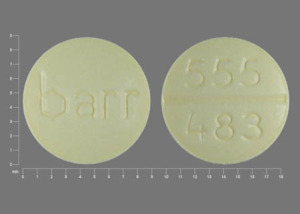Amiloride / Hydrochlorothiazide Dosage
Medically reviewed by Drugs.com. Last updated on Aug 3, 2023.
Applies to the following strengths: 5 mg-50 mg
Usual Adult Dose for:
Additional dosage information:
Usual Adult Dose for Congestive Heart Failure
Initial dose: Amiloride 5 mg-Hydrochlorothiazide 50 mg orally once a day or in divided doses
Maintenance dose: Amiloride 5 to 10 mg-Hydrochlorothiazide 50 to 100 mg orally once a day or in divided doses
Comments:
- Doses greater than amiloride 10 mg-hydrochlorothiazide 100 mg per day are usually not needed and there is no controlled data with such doses.
- Hydrochlorothiazide can be given at doses of 12.5 to 50 mg per day when used alone.
- Patients usually do not require more than hydrochlorothiazide 50 mg per day when combined with other antihypertensive agents.
Use: Treatment of patients with hypertension or congestive heart failure who develop hypokalemia when thiazides or other kaliuretic diuretics are used alone, or in whom maintenance of normal serum potassium levels is considered to be clinically important (e.g., digitalized patients or patients with significant cardiac arrhythmias).
Usual Adult Dose for Hypertension
Initial dose: Amiloride 5 mg-Hydrochlorothiazide 50 mg orally once a day or in divided doses
Maintenance dose: Amiloride 5 to 10 mg-Hydrochlorothiazide 50 to 100 mg orally once a day or in divided doses
Comments:
- Doses greater than amiloride 10 mg-hydrochlorothiazide 100 mg per day are usually not needed and there is no controlled data with such doses.
- Hydrochlorothiazide can be given at doses of 12.5 to 50 mg per day when used alone.
- Patients usually do not require more than hydrochlorothiazide 50 mg per day when combined with other antihypertensive agents.
Use: Treatment of patients with hypertension or congestive heart failure who develop hypokalemia when thiazides or other kaliuretic diuretics are used alone, or in whom maintenance of normal serum potassium levels is considered to be clinically important (e.g., digitalized patients or patients with significant cardiac arrhythmias).
Renal Dose Adjustments
Use with caution
If impairment becomes evident: Discontinue this drug.
Liver Dose Adjustments
Use with caution
Precautions
US BOXED WARNING:
- HYPERKALEMIA: Like other potassium-conserving diuretic combinations, amiloride and hydrochlorothiazide may cause hyperkalemia (serum potassium levels greater than 5.5 mEq/L). In patients without renal impairment or diabetes mellitus, the risk of hyperkalemia with this combination product is about 1% to 2%. This risk is higher in patients with renal impairment or diabetes mellitus (even without recognized diabetic nephropathy). Since hyperkalemia is potentially fatal if uncorrected, it is essential to monitor serum potassium levels carefully in any patient receiving amiloride hydrochloride and hydrochlorothiazide, particularly during treatment initiation, dose adjustments, and any illness that could affect renal function.
Safety and efficacy have not been established in patients younger than 18 years.
Consult WARNINGS section for additional precautions.
Dialysis
Data not available
Other Comments
Administration advice: Should be taken with meals.
Storage requirements: Protect from light.
Monitoring:
- Metabolic: Serum electrolytes
More about amiloride / hydrochlorothiazide
- Check interactions
- Compare alternatives
- Pricing & coupons
- Drug images
- Side effects
- During pregnancy
- Drug class: potassium sparing diuretics with thiazides
- En español
Patient resources
- Hydrochlorothiazide and amiloride drug information
- Amiloride and hydrochlorothiazide (Advanced Reading)
Other brands
Professional resources
Related treatment guides
Further information
Always consult your healthcare provider to ensure the information displayed on this page applies to your personal circumstances.


